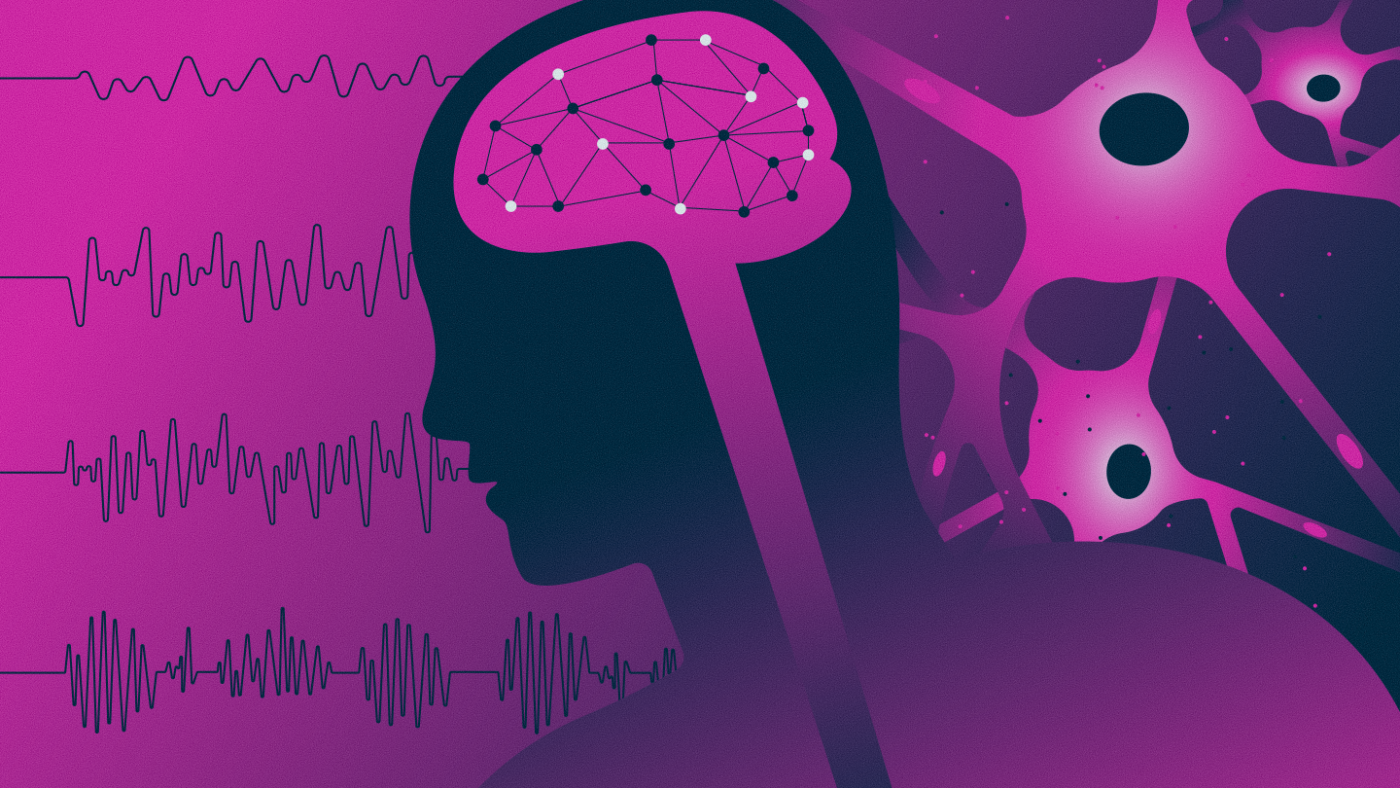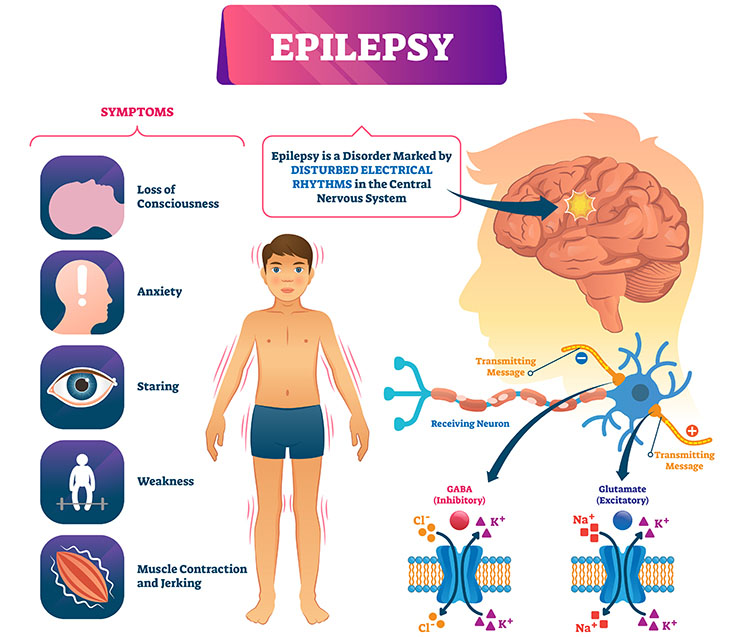
Epilepsy is a chronic neurological condition characterized by recurrent epileptic seizures, which are caused by excessive electrical activity of neurons in the brain. A seizure can be very different and depends on which part of the brain is affected and how much of the brain is affected.
An epileptic seizure can be compared to an electrical storm in the brain, when certain groups of neurons start signaling suddenly and intensely. It can cause a variety of symptoms such as seizures, strange behavior, changes in emotions and even loss of consciousness. Other symptoms can range from short-term lapses in concentration to severe seizures.
There are several forms of epilepsy that differ in their symptoms and treatments. Some people may only have one or two seizures in their lifetime, while others may have seizures every day. There are also many different causes of epilepsy, including genetic predisposition, brain injury or infections, stroke, and brain tumors.
Epilepsy can have serious consequences, including physical trauma from seizures, psychological stress, and social rejection. However, with the right treatment, most people with epilepsy can manage their symptoms and lead active, fulfilling lives.
Causes of epilepsy
There are many reasons why epilepsy can develop, including genetic factors, trauma, disease, and certain brain disorders. The causes often depend on age and the type of epilepsy.
Genetic factors: Many genetic disorders can cause epilepsy, including Dravet syndrome, multiple sclerosis, and Angelman syndrome. Other genetic factors may increase the risk of certain types of epilepsy.
Trauma: Trauma to the brain can cause epilepsy. The risk increases if the injury is severe, especially if it involves the middle parts of the brain, which contain the most neurons.
Brain diseases: Various brain diseases such as brain tumors and stroke can cause epilepsy. These conditions cause damage to brain tissue that can cause abnormal electrical activity.
Infections: Infections that affect the brain can cause epilepsy. Such infections include meningitis, AIDS, and viral encephalitis.
Diseases affecting the nervous system: Alzheimer's disease, neurofibromatosis, phenylketonuria and many other diseases of the nervous system can cause epilepsy.
Prenatal and birth injuries: Abnormal brain development during pregnancy, due to genetic mutations or environmental factors, can cause structural brain damage that can lead to epilepsy. Birth injuries, including lack of oxygen or infections, can also increase the risk of epilepsy.
It is important to note that in many cases the cause of epilepsy remains unknown. This is called idiopathic or cryptogenic epilepsy.

What are the symptoms of epilepsy?
Epilepsy symptoms can vary widely and depend on where in the brain the seizure starts and how it spreads.
When most people think of epilepsy, the first thing they think of is tonic-clonic seizures, which are characterized by uncontrolled muscle contractions, can involve the entire body, and can be quite intense. However, not all epileptic seizures cause these types of symptoms. Other forms of epilepsy may cause only small convulsions of a part of the body or may occur with sudden movements, such as raising the arm or head.
Some epileptic seizures, especially those that begin in the brain structures responsible for sensation, emotion, or behavior, can cause strange sensations, unusual emotions, or behavior. These can include experiences such as unpleasant smells, feelings of joy, deja vu or sudden fatigue.
Also, some epileptic seizures can cause excess mental functions, including fatigue, disorientation, difficulty speaking or understanding language, memory problems, or even psychosis.
Absence attacks usually occur in childhood or early adolescence. They are characterized by a sudden stop to function or react to the environment, which can last for several seconds and usually does not pose a danger to the person.
Epileptic seizures can cause an unexpected worsening of consciousness, including loss of consciousness or inability to pay attention.
For some people, an epileptic seizure can cause them to stop suddenly or even fall to the ground.
It is important to understand that each person may experience different symptoms of epilepsy, depending on the type of seizure and individual characteristics of the brain. If you think you have epilepsy symptoms, be sure to see a healthcare professional.
Types of epilepsy
Epilepsy is a very diverse disease, and the types of epileptic seizures can vary based on where they start in the brain, how long they last, and how they appear. There are several different classifications of epilepsy based on the nature of the seizures, the part of the brain where the seizure begins, and the patient's consciousness during the seizure.
Based on the location of the seizure in the brain, the types of epilepsy are divided into two main categories: focal epilepsy and generalized epilepsy.
Focal epileptic seizures begin in a certain part of the brain. They can be with or without loss of consciousness. Focal seizures can manifest as disturbances in motor, sensory, autonomic or psychological functions. They can also turn into generalized seizures.
Seizures in generalized epilepsy begin in the entire brain at the same time. There are several main types of seizures in this category, including absence seizures, myoclonic seizures, tonic and clonic seizures.
Each form of epilepsy has specific symptoms and may require a different type of treatment. For example, absence seizures usually occur in childhood and are characterized by short-term lapses in attention that are difficult to notice. Meanwhile, tonic and clonic seizures are very noticeable and can be very dangerous because they can cause a fall or other injury.
:max_bytes(150000):strip_icc()/epilepsy-overview-4155857_final_edited-dcaf959b3f214bc3b6b6e48302a5430a.png)
How is epilepsy classified?
According to the causes of epilepsy, it can be divided into idiopathic, symptomatic and cryptogenic epilepsy.
Idiopathic epilepsy is usually genetically related, and is currently considered to be genetically indolent. This type of epilepsy usually occurs in childhood or early adolescence and may be associated with specific epilepsy syndromes. Seizures in idiopathic epilepsy are usually typical and the prognosis is usually good: most patients with this form have seizures in adulthood.
Symptomatic epilepsy, also called structural or focal epilepsy, involves a clear and identifiable brain lesion or disorder. These causes can be various, such as brain trauma, stroke, infections, tumors, brain malformations or neurodegenerative diseases. Seizures of this form usually begin in adulthood, although they can also occur in childhood.
Cryptogenic epilepsy is diagnosed when a clear cause cannot be determined, but a brain disorder is believed to be present. Although the symptoms and seizure types may be similar to those of symptomatic epilepsy, diagnostic tests such as magnetic resonance imaging (MRI) are normal.
The latest of 2017 The International Epilepsy Federation classification also lists possible causes of epilepsy as genetic, immune, infectious, metabolic, structural, and unknown.
Consequences
Epilepsy, like any other disease, can have various consequences for a person and his life. The consequences can be physical, psychological and social.
The spectrum of physical consequences is very wide, from mild to very serious. People with epilepsy can experience seizure injuries, such as from a fall during a seizure, or from a prolonged seizure, which can lead to hypoxia (lack of oxygen) and, in severe conditions, even death. Another serious consequence is the risk of sudden unexplained death, which, although rare, is a real threat for some people with epilepsy.
The psychological consequences can also be significant. Many people with epilepsy experience anxiety or depression. Anxiety may arise from fear associated with the unknown date of the attack or its consequences. Depression can be related to the disease, its consequences, or to medications used to treat epilepsy.
In addition, epilepsy can have significant social consequences. Many people with epilepsy experience discrimination at work or school. This can include everything from direct discrimination and negative attitudes to difficulties in the labor market, transport or education. Epilepsy can also affect a person's social life and relationships, as well as causing problems with driving, pregnancy and more.
However, many of these consequences can be reduced or managed with the right treatment, support and education. It is important to note that although epilepsy is a serious illness, many people with epilepsy live full, fulfilling lives.

Sources of information:
National Institute of Neurological Disorders and Stroke. (2021). The epilepsies and seizures: hope through research. https://www.ninds.nih.gov/Disorders/Patient-Caregiver-Education/Hope-Through-Research/Epilepsies-and-Seizures-Hope-Through
World Health Organization. (2021). Epilepsy. https://www.who.int/news-room/fact-sheets/detail/epilepsy
Epilepsy Foundation. (2021). What is epilepsy? https://www.epilepsy.com/learn/about-epilepsy-basics/what-epilepsy
Mayo Clinic. (2021). Epilepsy symptoms & causes. https://www.mayoclinic.org/diseases-conditions/epilepsy/symptoms-causes/syc-20350093
NHS. (2021). Symptoms of epilepsy. https://www.nhs.uk/conditions/epilepsy/symptoms/
National Institute of Neurological Disorders and Stroke. (2021). NINDS Epilepsy Information Page. https://www.ninds.nih.gov/Disorders/All-Disorders/Epilepsy-Information-Page
Mayo Clinic. (2021). Epilepsy symptoms & causes. https://www.mayoclinic.org/diseases-conditions/epilepsy/symptoms-causes/syc-20350093
Mayo Clinic. (2021). Epilepsy diagnosis & treatment. https://www.mayoclinic.org/diseases-conditions/epilepsy/diagnosis-treatment/drc-20350098
Epilepsy Foundation. (2021). How is epilepsy diagnosed? https://www.epilepsy.com/learn/diagnosis
Mayo Clinic. (2021). Epilepsy diagnosis & treatment. https://www.mayoclinic.org/diseases-conditions/epilepsy/diagnosis-treatment/drc-20350098
# epilepsija
